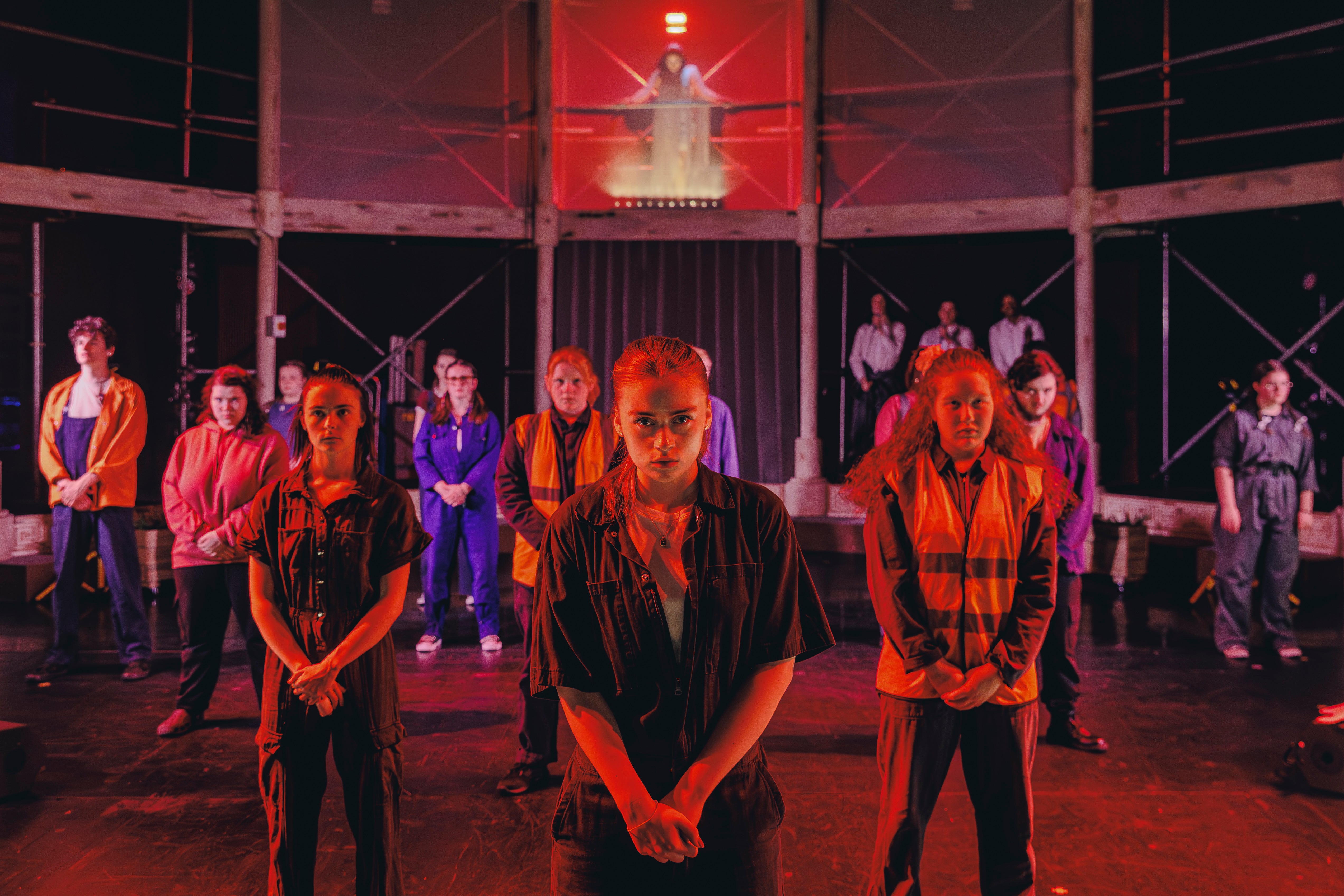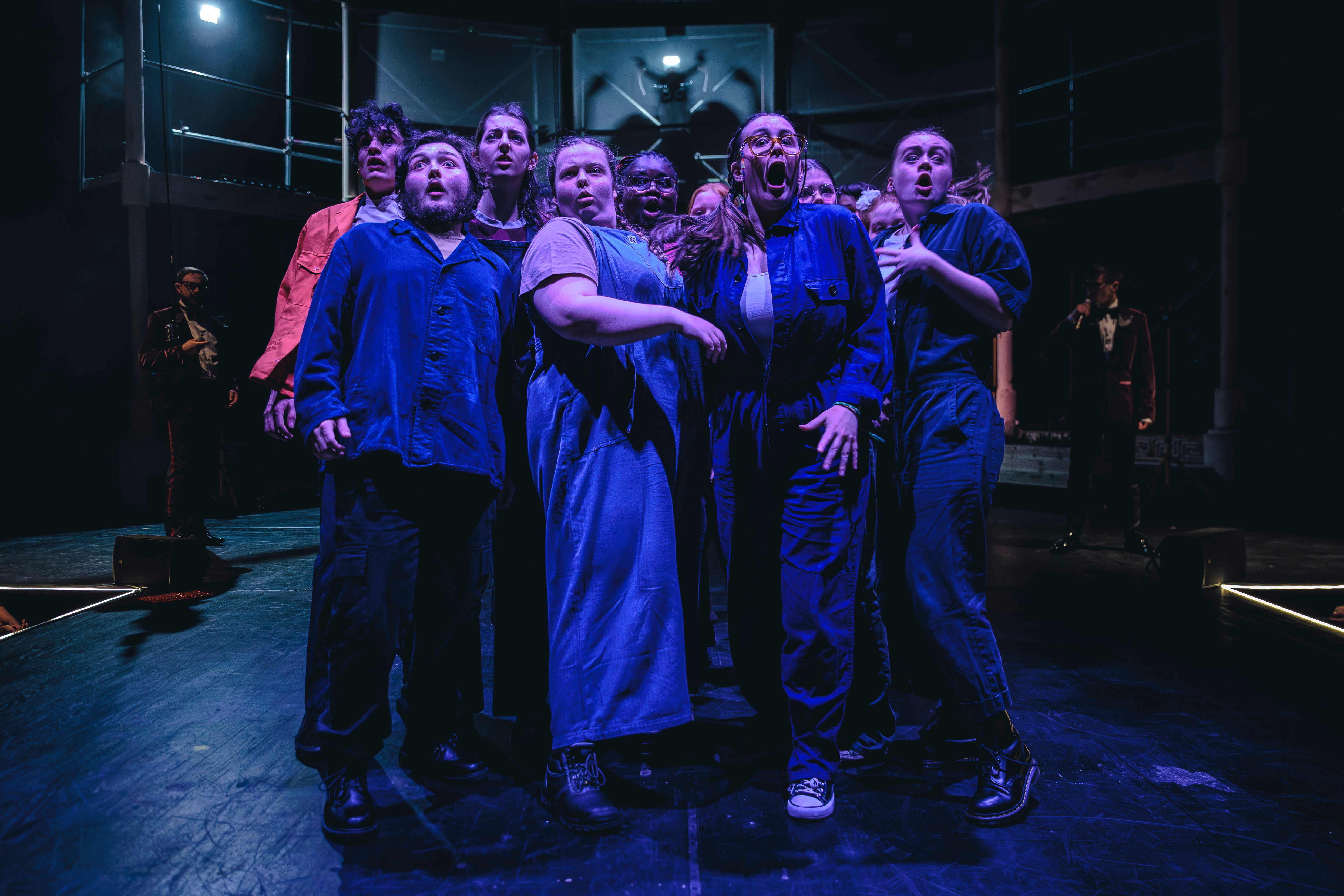In the grey skies above the city of Salford, Zeus, Hera and Hermes recline, playing with the fates of the mortals living below. Powerless to their might, a band of Olympians defy their commands, wrestling to regain control of their freedom and their lives. The message of Gods of Salford – an original play that’s just been staged in Manchester – is blunt. It’s meant to be. This was a production that didn’t at all shy away from its working-class origins.
It was also the product of 25 young, first-time actors from working-class backgrounds, who were tasked with reimagining tales from Greek mythology as raucous testaments to class-driven defiance. The play came about between Manchester’s Lowry Theatre, which is celebrating its 25th anniversary, and the not-for-profit Not Too Tame, which has long incorporated working-class people and culture into the fabric of its being.
“It shows people what Salford’s made of and to remember us,” the play’s director Jimmy Fairhurst tells me. “We’re not something small. We’re here, we’re big, we’re bold, we’re northern, and that’s what the show’s all about.”
The approach feels timely, too, in the wake of the Netflix sensation Adolescence, which followed a 13-year-old boy accused of murder. Actor Stephen Graham, who also co-created the series, discovered its young star, Owen Cooper, through an intentional auditioning process that targeted working-class communities in the north. Cooper, who lived on a Warrington council estate at the time of his audition, is soon set to star in Emerald Fennell’s adaptation of Wuthering Heights. Graham calls the young actor’s success the show’s “greatest achievement”.
Cooper’s rise to fame is unusual, though, with the current landscape in British acting relatively bleak when it comes to working-class talent. A study last year found that working-class representation in the TV and film industry has plummeted to its lowest level in a decade, with only 8 per cent self-identifying as from that background.
Fairhurst, who also plays Zeus in the production, is only too aware of that fact. Describing himself as a modern-day Billy Elliot, Fairhurst says it took years for him to overcome doubts about his ability – or his right – to pursue a career in TV and theatre. “It was a big hurdle to overcome,” he says. “If you’re from a certain background and your parents aren’t headmistresses or prime ministers, you’re told ‘Don’t make a fuss’.”
It was something felt in each of the young people cast in the show as well, adds Jenny Riding, director of learning and engagement at the Lowry. “Giving themselves permission has been a massive challenge for the actors,” she says, adding that the young stars have often struggled with feelings of “self-sabotage”.
As a response, Riding, Fairhurst, and their team have developed a person-centred approach that puts the needs of young performers at the forefront. Each part of the process takes into account their sensitivities, with several individuals overcoming complex life circumstances such as mental health, homelessness and foster care, to make it to the stage. Support that is offered includes things as simple as the use of fidget spinners in rehearsals – which have helped performers with conditions including anxiety or attention deficit hyperactivity disorder (ADHD) – to transport help for those unable to afford it. More often than not, though, what is most provided is a sense of hope.
“Sometimes, because they don’t feel that they’re worth it, it can feel easier to quit and leave than it is to be told that you’ve failed again,” Fairhurst says. “This is where the pastoral care side of it comes in. In a professional setting they might have lost their chance, but we reconnect with them and give them some support and encouragement and help get them back in the room.”

He continues: “There is an untapped scene on the coalface of culture, and that is because working-class people don’t consider themselves or don’t believe that they are artists,” says Fairhurst. “There’s a bloke down the road from me who passed away and there were boxes of poetry under his bed. No one knew. And all these people go, ‘Oh that’s not for me, or the likes of me’, and I think there’s something [important] about us going, ‘no it is’. If you don’t hear your voices or see your stories, how do you know that you’re relevant? How do you know you’ve got a voice?”
He’s seen the promise of this first hand. A 55-year-old friend of his, a joiner by trade, found his first job in the media via a set-building company that provides props for TV and film. It’s proof, Fairhurst adds, that it’s never too late to change your life.
For 19-year-old Callum, who lives in supported accommodation, the change has been immediate. He first came across the Lowry through a scheme that provided those at risk of homelessness with free theatre tickets (in addition to other support). “I came to a show called My Beautiful Laundrette and I met Jenny for the first time at the doors,” he says. “I was talking about how good the show was and asked who I would talk to about actually getting on stage. I said, ‘one day I’m gonna be on that stage’ and now a year later, I am on that stage.” Currently, he dreams of one day starring in Coronation Street.
Sixteen-year-old Alesha adds that she and the rest of the actors working in the company can’t help but bring their own experiences of resilience and strength to the stage. “I grew up with a lot of bullying as someone who is Black and plus-size,” she says. “It’s been really hard to deal with that. I guess coming into these rehearsals I was worried that I wouldn’t fit in – but it’s diverse and they’ve looked after me.”

“It’s like being with your friends,” explains 19-year-old Emily, who came to the Lowry through a programme for young carers. “This is one of the best groups I’ve worked with.”
The group’s choice to use Greek myths as the medium to channel their message was also intentional. “Power struggles and this idea of class really permeates all of it,” says Riding. “[Characters] with power make decisions … without much understanding of how it affects the people at the bottom of the pile.”
But beyond the contents of the work itself, Not Too Tame is underpinned by something far more primal, and something felt by anyone who considers themselves an artist: the desire to make a mark.
“My brother wrote the song at the end of the performance,” says Fairhurst, choking up. “The group belted it out in rehearsals. They were looking at each other and crying, but they were also singing it to Media City from the balcony with tears in their eyes, and they were just repeating it: ‘Remember, remember, remember my name.’”

